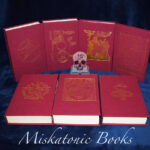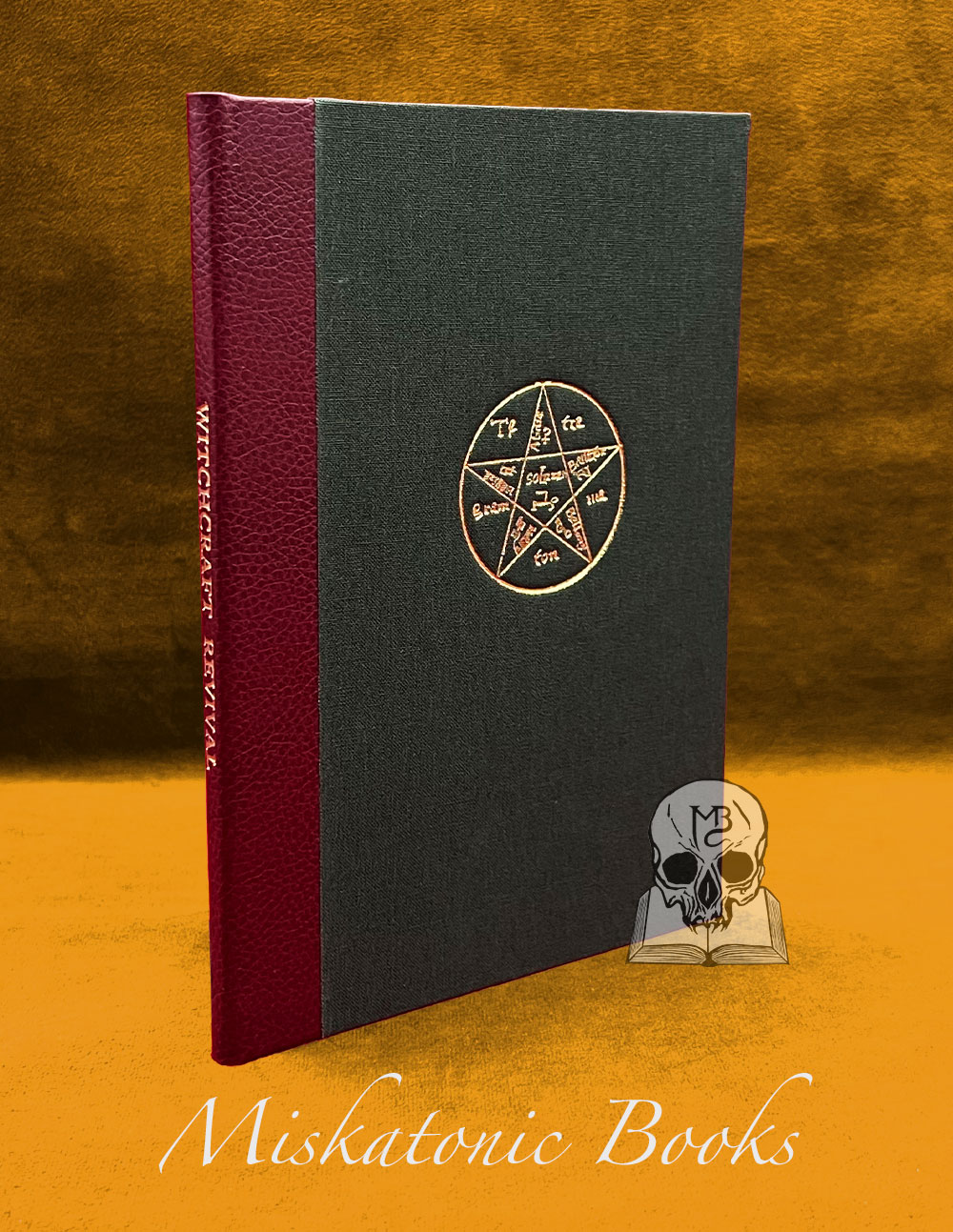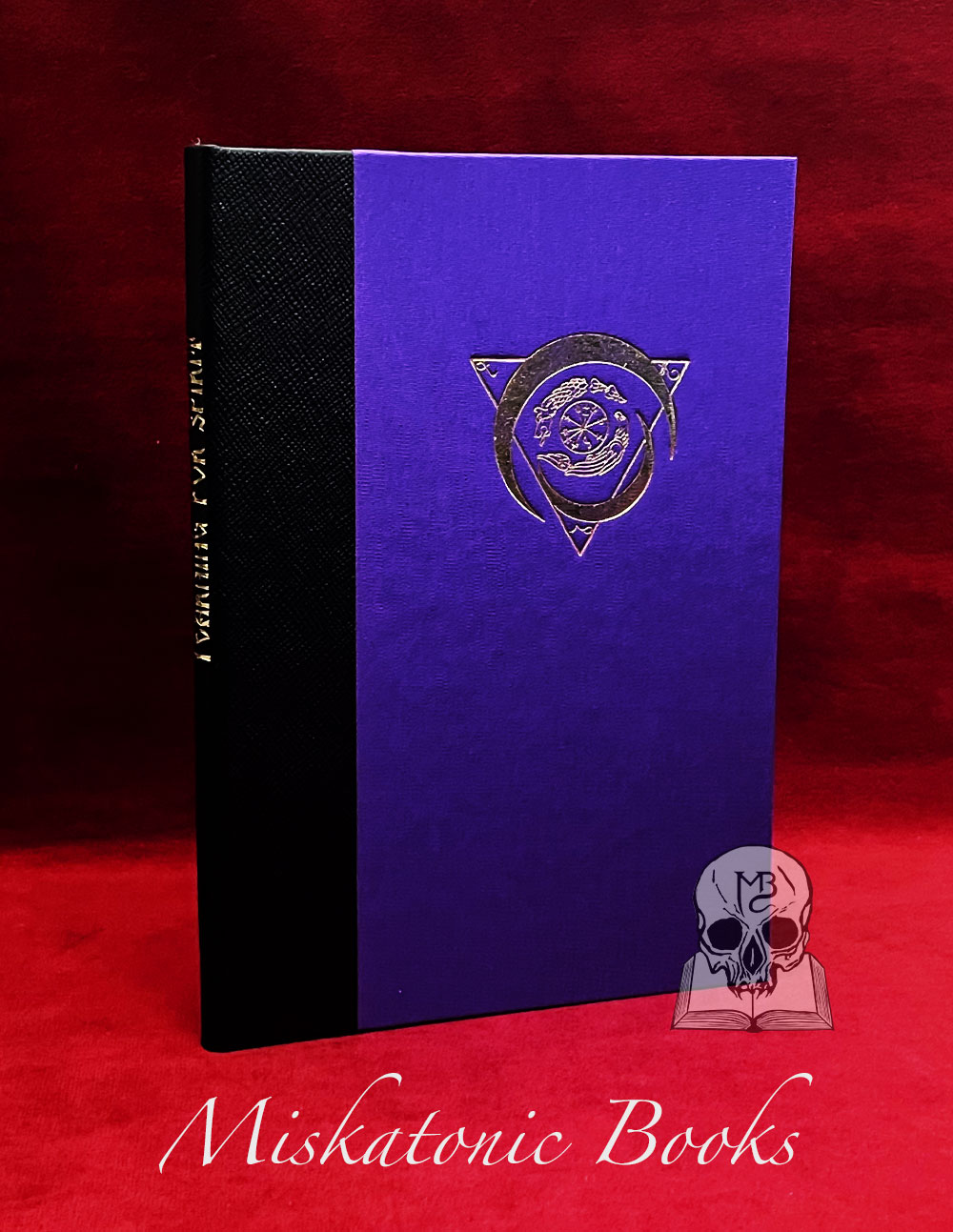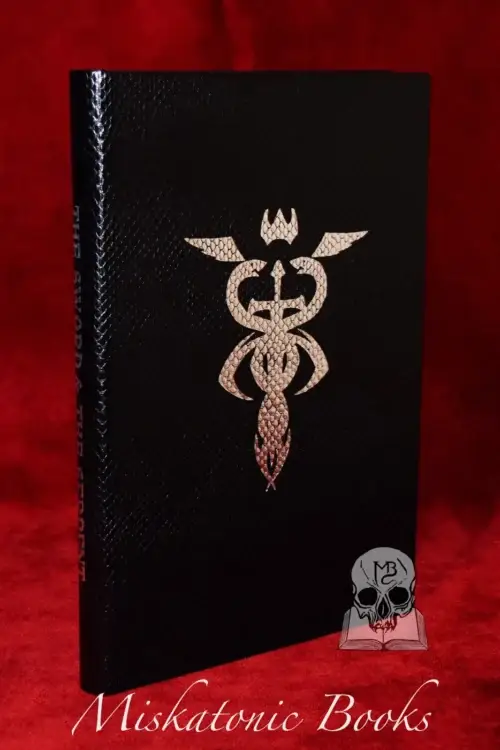$220.00 — or $220.00 Original price was: $220.00.$55.00Current price is: $55.00. / month for 4 months
SEVEN PILLARS OF OCCULT WISDOM: Seven Volumes (Limited Edition Hardcover Bound in Bordeaux Linen)
Out of stock
| Weight | 8 lbs |
|---|
A set of special bindings produced on behalf of the
members and friends of The Hell Fire Club
Being a collection of 7 volumes deemed useful and necessary to fulfilling a broad and deep study of the magickal arts and the unity of all things.
The Volumes of Seven Pillars of Occult Wisdom Comprises:
The Magus or Celestial Intelligencer:
Being a Complete system of Occult Philosophy. In three books: Containing the Antient and Modern Practice of the Cabalistic Art, Natural and Celestial Magic & c. ; shewing the wonderful effects that may be formed by a knowledge of the Celestial Influences, the Occult Properties of Metals, Herbs and Stones, and the Application of Active to Passive Principles Exhibiting The Sciences of Natural Magic; Alchemy or Hermetic Philosophy; Also The Nature Creation, and Fall of Man; His Natural and Supernatural Gifts; The Magical Power Inherent in the Soul &c. ; The Composition and Construction of All Sorts of Magic Seals, Images, Rings, Glasses & c. ; The Virtue and Efficacy of Numbers, Characters and Figures, of Good and Evil Spirits. Magnetism and Cabalistical or Ceremonial Magic; In which The Secret Mysteries of The Cabala are explained; The Operations of Good and Evil Spirits; All Kinds of Cabalistic Figures, Tables, Seals and Names with their use & c. The Times, Bonds, Offices and Conjuration of Spirits. To Which Is Added Biographia Antiqua , or the Lives of the most eminent Philosophers, Magi & c. The Whole illustrated with a great Variety of Curious Engravings, Magical and Cabalistical Figure & c. black and white line drawings and illustrations.
The Sacred Magic of Abramelin the Mage:
The Book of the Sacred Magic of Abramelin the Mage-originally published in 1900, translated by Samuel Mathers from a 15th-century French document-was purportedly written by Abraham for his son Lamech. Within this volume are three books: the first book is Abraham’s autobiography in which he speaks to his son, the second book is an explanation of the purification rituals necessary to bring the magician’s personal demon or ‘Holy Guardian Angel’ under his control and the third book details what miracles can be accomplished once the practitioner is able to use a form of magic controlled and directed by supernatural entities through sigils of magic words constructed in letter squares.
The Canon of all the Arts:
The Canon is the numerical interpretation of the Cosmic law and, since man is a microcosm of the universe, it is also the law of human nature. The history of all civilizations is the history of their interpretation of the Canon. Codified by ancient philosophers and guarded by priests in the temples, the Canon sanctified the society that possessed it, regulating its institutions in accordance with the laws of nature. Plato, writing in “The Laws of the Egyptian Canon, ” claimed that by its use the high civilization of ancient Egypt had been preserved from deterioration for 10,000 years.
The Canon was instituted by the ancient theocracies as a standard in music, architecture and all other arts. Even after the decline of the old world order and of the canonical standard, knowledge of the Canon was preserved in the mystery schools of Greece and Alexandria, and in the tradition of masonic and other craft guilds.
One of the most revolutionary books of the late 19th century, The Canon owes its high reputation to the august literary style of its author, as well as to its remarkable contents. Its strong influence on modern mysticism was acknowledged by Aleister Crowley and F. Bligh Bond among others, and has long been a prized item in the library of the discerning mystic and occultist.
The Serpent Power:
written under the name Arthur Avalon it was in fact Sir John George Woodroffe (1865–1936), who was a British Orientalist whose work helped to unleash in the West a deep and wide interest in Hindu philosophy and Yogic practices. Woodroffe’s ‘The Serpent Power – The Secrets of Tantric and Shaktic Yoga’, is a source for many modern Western adaptations of Kundalini yoga practice. It is a philosophically sophisticated commentary on, and translation of, the Satcakra-nirupana (“Description of and Investigation into the Six Chakras or Bodily Centres”) of Purnananda (dated c.AD 1550) and the Paduka-Pancaka (“Five-fold Footstool of the Guru”). The term “Serpent Power” refers to the kundalini, an energy said to be released within an individual by meditation techniques.
The Hermetic Mystery:
A major work on spiritual alchemy first published in 1850 and complete in four parts:
Part I
An Exoteric View of the Progress and Theory of Alchemy
Chapter I ~ A Preliminary Account of the Hermetic Philosophy, with the more Salient Points of its Public History
Chapter II ~ Of the Theory of Transmutation in General, and of the First Matter
Chapter III ~ The Golden Treatise of Hermes Trismegistus Concerning the Physical Secret of the Philosophers’ Stone, in Seven Sections
Part II
A More Esoteric Consideration of the Hermetic Art and its Mysteries
Chapter I ~ Of the True Subject of the Hermetic Art and its Concealed Root.
Chapter II ~ Of the Mysteries
Chapter III ~ The Mysteries Continued
Chapter IV ~ The Mysteries Concluded
Part III
Concerning the Laws and Vital Conditions of the Hermetic Experiment
Chapter I ~ Of the Experimental Method and Fermentations of the Philosophic Subject, according to the Paracelsian Alchemists and Some Others
Chapter II ~ A Further Analysis of the Initial Principle and Its Education into Light
Chapter III ~ Of the Manifestations of the Philosophic Matter
Chapter IV ~ Of the Mental Requisites and Impediments Incidental to Individuals, either as Masters or Students, in the Hermetic Art
Part IV
The Hermetic Practice
Chapter I ~ Of the Vital Purification, Commonly Called the Gross Work
Chapter II ~ Of the Philosophic or Subtle Work
Chapter III ~ The Six Keys of Eudoxus
Chapter IV ~ The Conclusion
“And this is the grand Hermetic secret, that there is a Universal Subject in nature, and that Subject is susceptible of nourishment in Man: and this is the greatest mystery, of all mysteries the most wonderful, that man should be able not only to find the Divine Nature, but to effect It.” Mary Anne Atwood.
Aradia: The Gospel of the Witches:
A book composed by the American folklorist Charles Godfrey Leland that was published in 1899. It contains the religious text of a group of pagan witches in Tuscany, Italy that documented their beliefs and rituals. The contents of the book were very influential in the development of the contemporary Pagan religion of Wicca.
The text is a composite. Some of it is Leland’s translation into English of an original Italian manuscript, the Vangelo (gospel). Leland reported receiving the manuscript from his primary informant on Italian witchcraft beliefs, a woman Leland referred to as “Maddalena” and whom he called his “witch informant” in Italy. The rest of the material comes from Leland’s research on Italian folklore and traditions, including other related material from Maddalena. Leland had been informed of the Vangelo’s existence in 1886, but it took Maddalena eleven years to provide him with a copy. After translating and editing the material, it took another two years for the book to be published. Its fifteen chapters portray the origins, beliefs, rituals, and spells of an Italian pagan witchcraft tradition. The central figure of that religion is the goddess Aradia, who came to Earth to teach the practice of witchcraft to peasants in order for them to oppose their feudal oppressors and the Roman Catholic Church.
Since the 18th century writer Tartarotti, the field of witchcraft studies has generally accepted the notion that ancient Etruscan beliefs survived in some form through Italian folklore, here in the ‘Aradia’ is a full account of these secret teachings.
The History of Magic:
Written in France under the pseudonym ‘Eliphas Levi Zahed’ and first published in English by Golden Dawn adept A.E.Waite. Eliphas Levi (1810-1875) was one of the most important figures of the occult revival, and was claimed by Aleister Crowley to be an earlier incarnation of himself.
This text presents a classic history of magic and occultism, and is a book of which A.E. Waite said “there is nothing in the occult literature to compare with it…”The History of Magic” is the most arresting, entertaining and brilliant of all studies on the subject”.
Alphonse Louis Constant, better known by his pen name Eliphas Levi, was a master of the traditional Rosicrucian interpretation of the Kabbalah. He was born in France in 1810, and through the offices of the parish priest, was educated for the church at Saint-Sulpice. He was later expelled from seminary for teaching doctrines contrary to those of the Roman Catholic Church. In 1824 Levi began studying the occult sciences, and wrote about magic and the Kabbalah for the next three decades. His other books include Transcendental Magic, Mysteries of the Qabalah, and The Book of Splendours.
A.E. Waite (1857-1942) is one of the best known authors and translators of magic and the occult. He is the creator of the Rider-Waite tarot and is the author of several books including Book of Black Magic and Pictorial Keys to the Tarot.
 SEVEN PILLARS OF OCCULT WISDOM: Seven Volumes (Limited Edition Hardcover Bound in Bordeaux Linen)
SEVEN PILLARS OF OCCULT WISDOM: Seven Volumes (Limited Edition Hardcover Bound in Bordeaux Linen)
| 5 star | 0% | |
| 4 star | 0% | |
| 3 star | 0% | |
| 2 star | 0% | |
| 1 star | 0% |




Need news faster? Add our ‘Daily Alerts’ newsletter for time-sensitive information like rare, limited edition titles just announced or back in stock. Also, we highlight flash 24-hour sales on select products. [Subscribe Here]
